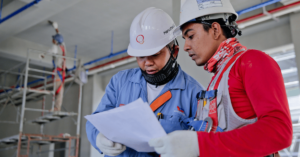Most health and safety policies are focused on physical wellbeing. But are industries fixated on physical safety also caring for mental health?
Key Points
- Suicide rates among middle-aged men are rising in the UK. The Samaritans class them as a ‘high-risk group’
- According to the Office of National Statistics (ONS) men aged 45-49 years had the highest age-specific suicide rate with 24.1 lives lost per 100,000
- The HSE has created management standards to help health and safety managers create a supportive framework to reduce stress and protect mental health
Mental Health At Work
According to the Health and Safety Executive (HSE), around one in four people in the UK will experience issues with their mental health.
And when it comes to work, the HRD says that 95% of those taking time off because of stress gave a different reason to their employer.
*Suicide in construction kills more people than falls, and depression and anxiety have overtaken musculoskeletal disorders
Mental Health In Male-Dominated Industries
- Men account for around 89% of the workforce in construction.
- Thanks to census data, we also know that 33.5% of people working in construction are aged between 40-54 years old.
- The Samaritans class middle-aged men as a high-risk suicide category. It found that men in this age bracket (45-49), had the highest suicide rate, recording 25.5 deaths per 100,000.
Debunking stereotypes
Construction is stereotyped as a tough industry where talking about feelings is a no-go area. That’s a harmful misconception that perpetuates tired and damaging points of view.
‘Man up’, for example, is a jokey yet cruel response to vulnerability, but it’s in common use.
If you’re shamed for your most basic feelings, like ‘I feel tired today’, you’re less likely to speak up when it becomes exhaustion, sadness or loneliness.
Part of conforming to the Health & Safety Act is ensuring your employee’s mental health is as healthy as their physical health. So what can we do?
How To Manage Mental Health In Construction Teams
We must train our staff to recognise symptoms and signpost them to places where they can obtain help.
An open environment, supported by management and staff alike, will make a huge difference to a crisis that we now face and can no longer ignore.
It’s the responsibility of health and safety managers to challenge stigma and create a secure and non-judgmental environment to protect workers in construction.
One way of doing this is fostering a culture where mental health is openly discussed so that all staff feel they can talk about what matters to them.
How To Apply Management Standards
The HSE has developed a set of management standards, spanning six areas that will help to reduce stress and protect mental health.
It claims that if employers don’t manage these six areas, productivity will drop, and accident and sickness absence rates will increase:
- Manage the demands placed on your employee by keeping an eye on the volume of workload, work patterns and the work environment
- Put the employee in the driving seat and let them have a say in the way they do their work
- Encourage, sponsor and support your employee, and create resources on behalf of your organisation to support line management and colleagues
- Build a positive workplace culture, avoid conflict and deal with unacceptable behaviour
- Clearly define roles and give everyone a sense of purpose
- Tackle organisation changes transparently and communicate clearly and regularly
Your managers and team leaders need the training to recognise the signs of anxiety, stress and depression.
They must also have emotional dexterity and intelligence to support someone who’s resistant to mental health as a concept or isn’t ready to ask for help.
Feelings aren’t always visible on the surface. That’s why it’s so important to have a functional mental health framework working in the background, to keep their working lives manageable.
The whole industry is heading for a mental health overhaul. You can help action change in your organisation by educating everyone on staff about the realities of mental health.
Creating Context
A personal crisis affects how you see the world and sometimes, it can affect how you do your job. The change can be short-term or transformational, but either way, the things that cause your stress levels to rise are relevant.
You’re not there to diagnose, or summon employees for counselling or support – that must come from them. What you can do is prep the environment and internal knowledge so that everyone is ready for a mental health crisis, can recognise the symptoms of depression, anxiety or stress, and respond pro-actively and positively.
How you mobilise and respond should give your employees the confidence that the way they feel is okay and you’re going to be supportive, not judgmental.
Look Out For Stressful Life Events
Your team might be more comfortable describing the situation they’re in, rather than delving into the turmoil they’re holding inside.
Although you can never presume to understand someone’s feelings, statements like, ‘I’m divorcing my partner’, or ‘I’m moving house’ tells you a lot about what’s going on in their world.
What you can do is manage a supportive culture around them, without asking for details they’re not comfortable enough to share.
You can coach your managers and team leaders to look out for life events that will raise stress levels:
- Bereavement
- Divorce
- Moving house
- Weddings
- New children
- Change in income (partner has lost their job, for example)
- New management
- Redundancies
You may find that talking about change lays the groundwork to talk about mental health later down the line, especially if you work in an industry like construction where mental health is still an uncomfortable taboo.
Regular one-to-one meetings with your employees and building team rapport will help you to support them through life events and changes.
What Are The Signs To Look Out For?
When you’re with your team, you should always be looking out for any signs that their mental health is suffering.
That could look like:
- Disengagement
- Worrying or feeling anxious a lot more
- Different eating habits
- Lower productivity levels
- Fatigue
Look out for any signs your team might be struggling, so you can begin to help them as soon as possible.
Mental Health Support For Construction Workers
Building Mental Health (BMH) has created ‘an industry-wide framework and charter to tackle the mental health crisis in the construction industry.’ It provides access to mental health support, awareness training, and puts in place systems and structures to support everyone in construction.
Time to Change Wales is a charity working to make lives better for everyone in Wales by ending mental health discrimination. It advocates sharing experiences to end the stigma. You could organise talks from influential people who are facing their own mental health difficulties from inside or outside your organisation.
And Mind has a fantastic resources section on how to approach mental health at work.
In February 2020, TSW signed the Time To Change Wales pledge to help end the stigma surrounding mental health. If you want help weaving mental health safety practices into your policies and procedures, we can support you.







